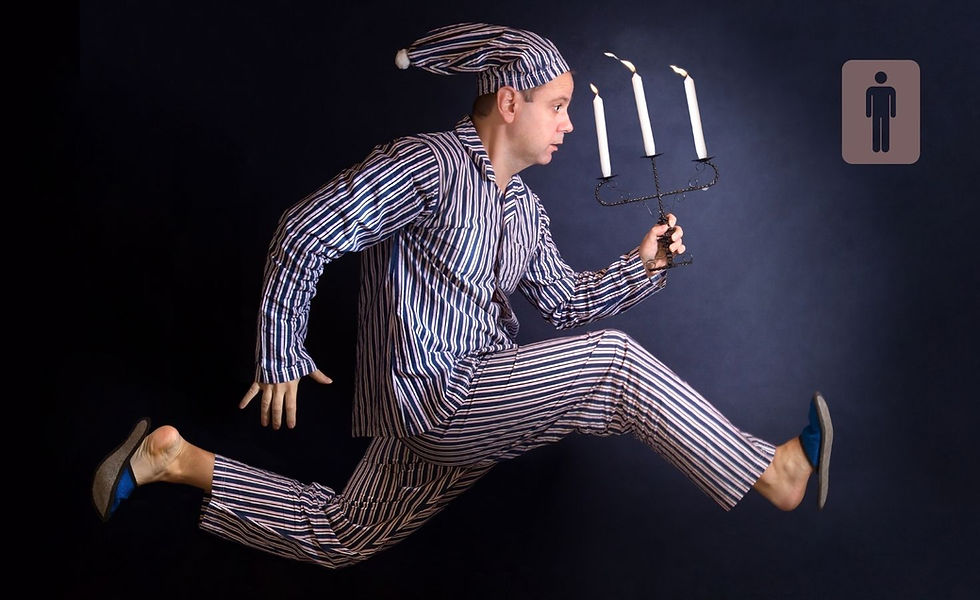If you're like most people, a good night's sleep is crucial to your overall health and wellbeing. But if you suffer from nocturia, you know that getting a whole night's rest can be next to impossible. Nocturia is a condition that causes you to wake up multiple times during the night to urinate, and it can be extremely disruptive to your sleep cycle.

Is Frequent Urination at Night (Nocturia) Keeping You Up?
Nocturia can be a pesky problem that keeps you up. It affects both men and women equally. According to studies and surveys, 69 % of men and 76 % of women over the age of 40 get up at least once per night to use the restroom.
If you are experiencing nocturia, you may not get a good night's sleep as you have to go to the bathroom several times during the night. It can be caused by many factors. Understanding the situation better can assist you in determining the best treatment option.
5 Common Causes of Nocturia
You wake up in the middle of the night. Again. You’re tired and just want to sleep, but you have to go to the bathroom. If this sounds like you, you may be wondering what’s causing your nocturia and what you can do about it.
1. Polyuria
One common cause of nocturia is polyuria, which is the excessive production of urine. Polyuria can be caused by many different things, including diabetes, drinking too much fluid, and taking certain medications.
Sometimes it can be caused by poor kidney function. When the kidneys are not functioning properly, they are unable to retain fluid, resulting in an excessive loss of fluid in the form of urine.
If the nocturia's cause is due to poor kidney function, then treatment involves improving renal function through medications and lifestyle changes.

2. Prostate enlargement
Nocturia is a very common and disruptive symptom of BPH or an enlarged prostate in men.
Because the prostate is enlarged, additional pressure is placed on the urethra (the tube through which urine flows from the bladder and out of the body) and urine is retained in the bladder. Sufferers may need to urinate more frequently or urgently, including at night.
There are a few different ways to treat prostate enlargement. One is by taking a supplement with saw palmetto extract & pumpkin seed oil. This helps to shrink the prostate and make it easier to urinate. Another option is surgery. This is usually only done if the enlargement is severe and causes problems such as urinary retention or obstruction. Medication may also be prescribed to help relieve symptoms.
3. Urinary tract infection (UTI) or bladder infection
UTIs are a common cause of nocturia, especially in women. When a UTI develops, the bacteria can spread to the bladder and cause inflammation and irritation. This can lead to an increase in the frequency of urination, as well as leakage of urine during the night.
If your nocturia is caused by a UTI, you may need to see your doctor for antibiotics.
4. Overactive bladder
When the bladder becomes overactive, it sends signals to the brain that make people feel the need to urinate even when their bladder isn't full. This can lead to frequent trips to the bathroom at night, which can disrupt sleep and cause fatigue during the day.
There are a number of things that can help relieve symptoms of overactive bladder, including lifestyle changes like reducing fluid intake before bed and avoiding caffeine and alcohol. There are also medications available that can help relax the bladder muscles and reduce the frequency of trips to the bathroom.
In a small study, researchers administered 500 to 1,000 milligrammes of pumpkin seed oil to participants. The participants' symptoms of overactive bladder improved dramatically.
5. On certain medications/ supplements
Some common medications that can cause increased urination include diuretics and blood pressure medications. Additionally, some supplements, such as celery extract, can also lead to more frequent trips to the bathroom.
Consult your doctor if you experience frequent urination after starting certain medications or supplements.
Are Nocturia and Painful Urination Related?
Painful urination, also known as dysuria, is a common symptom that can have a variety of causes and is not always related to nocturia.
The most common cause is a urinary tract infection, but other causes include prostate problems, sexually transmitted infections, and kidney stones.

Does Sleep Position Affect Nocturia?
There is currently little research into the best sleeping position for nocturia. As a general rule, choose one that is both comfortable for you, promotes restful sleep, and does not contribute to pain upon waking.
According to some studies, sleep apnea has been linked to OAB symptoms in both men and women. This could be due to the effects of apnea episodes, which can cause low tissue oxygen levels throughout the body, including the urinary system.
Sleeping on your side may help if you have sleep apnea and OAB. It is estimated that switching from back to side sleeping can eliminate sleep apnea symptoms in about 20% of people.
How Can You Prevent Having Urgent Urination at Night?
There are a few things you can do to help prevent having urgent urination at night:
Limit your fluid intake at night. Drink plenty of fluids (especially water) during the day, but limit fluids 2-4 hours before going to bed.
Control your use of diuretics.
Raise your legs or wear compression socks.
Take advantage of afternoon naps.
Take Away
In conclusion, nocturia can be a major cause of sleep deprivation and should be taken seriously. There are several causes of nocturia, and treatment varies depending on the cause. One can experiment with lifestyle changes such as limiting fluid intake before going to bed. If the urgency of urination is caused by prostate enlargement, take supplements to reduce prostate inflammation.
The best course of action is to consult with your doctor to identify and discuss treatment options.
Related read:
